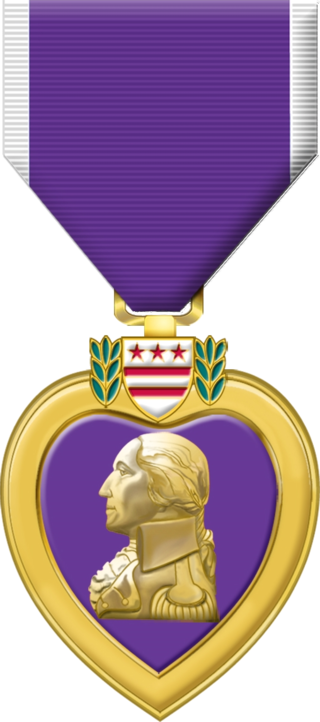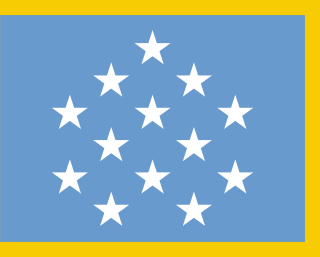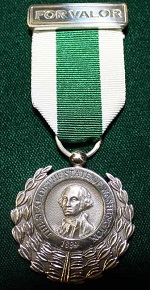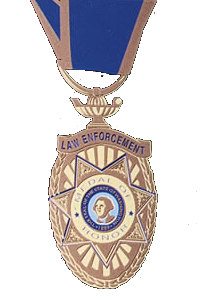
The Nobel Prizes are five separate prizes awarded to those who, during the preceding year, have conferred the greatest benefit to humankind, as established by the 1895 will of Swedish chemist, engineer, and industrialist Alfred Nobel, in the year before he died. Prizes were first awarded in 1901 by the Nobel Foundation. Nobel's will indicated that the awards should be granted in the fields of Physics, Chemistry, Physiology or Medicine, Literature, and Peace. A sixth prize for Economic Sciences, endowed by Sweden's central bank, Sveriges Riksbank, and first presented in 1969, is also frequently included, as it is also administered by the Nobel Foundation. The Nobel Prizes are widely regarded as the most prestigious awards available in their respective fields.

The Purple Heart (PH) is a United States military decoration awarded in the name of the president to those wounded or killed while serving, on or after 5 April 1917, with the U.S. military. With its forerunner, the Badge of Military Merit, which took the form of a heart made of purple cloth, the Purple Heart is the oldest military award still given to U.S. military members. The National Purple Heart Hall of Honor is located in New Windsor, New York.

The Nobel Prize in Physiology or Medicine is awarded yearly by the Nobel Assembly at the Karolinska Institute for outstanding discoveries in physiology or medicine. The Nobel Prize is not a single prize, but five separate prizes that, according to Alfred Nobel's 1895 will, are awarded "to those who, during the preceding year, have conferred the greatest benefit to humankind". Nobel Prizes are awarded in the fields of Physics, Medicine or Physiology, Chemistry, Literature, and Peace.
Leland Harrison (Lee) Hartwell is former president and director of the Fred Hutchinson Cancer Research Center in Seattle, Washington. He shared the 2001 Nobel Prize in Physiology or Medicine with Paul Nurse and Tim Hunt, for their discoveries of protein molecules that control the division (duplication) of cells.

Torsten Nils Wiesel is a Swedish neurophysiologist. With David H. Hubel, he received the 1981 Nobel Prize in Physiology or Medicine, for their discoveries concerning information processing in the visual system; the prize was shared with Roger W. Sperry for his independent research on the cerebral hemispheres.

The Order of Culture is a Japanese order, established on February 11, 1937. The order has one class only, and may be awarded to men and women for contributions to Japan's art, literature, science, technology, or anything related to culture in general; recipients of the order also receive an annuity for life. The order is conferred by the Emperor of Japan in person on Culture Day each year. It is considered equivalent to the highest rank of the Order of the Rising Sun, the Order of the Sacred Treasure, and the Order of the Precious Crown. The only orders that Japanese emperors bestow on recipients by their own hands are the Collar of the Supreme Order of the Chrysanthemum, the Grand Cordon of each order, and the Order of Culture.

The Texas Legislative Medal of Honor, commonly referred to as the Texas Medal of Honor, is the highest military decoration that can be conferred to a service member of the Texas Military Forces. It can also be conferred to service members of the United States Armed Forces. Subsequent decorations are conferred by a gold twig of four oak leaves with three acorns on the stem device. A lapel button is also conferred with this decoration.
Eisenhower Fellowships (EF) is a private, non-profit organization created in 1953 by a group of American citizens to honor President Dwight D. Eisenhower for his contribution to humanity as a soldier, statesman, and world leader. The organization describes itself as an "independent, nonpartisan international leadership organization".

The Medal of Honor (MOH) is the United States Armed Forces' highest military decoration and is awarded to recognize American soldiers, sailors, marines, airmen, guardians, and coast guardsmen who have distinguished themselves by acts of valor. The medal is normally awarded by the President of the United States and is presented "in the name of the United States Congress." It is often, but incorrectly, referred to as the Congressional Medal of Honor.

The Washington Medal of Valor is one of three statutory civilian awards and decorations issued by the state of Washington, the others being the Washington Medal of Merit and the Washington Gift of Life Award. Washington law does not describe an order of precedence for state decorations, though the Medal of Valor is generally considered the state's second-highest honor, after the Medal of Merit.
The Washington Gift of Life Award is one of three statutory civilian decorations and awards issued by the state of Washington, the others being the Washington Medal of Merit and the Washington Medal of Valor. Washington law does not describe an order of precedence for state decorations, though the Washington Gift of Life Award is generally considered inferior to the Medal of Valor and Medal of Merit.

The Washington Law Enforcement Medal of Honor is the only state decoration issued by the state of Washington to law enforcement officers, and is established by the Revised Code of Washington.. Washington law does not describe an order of precedence for state decorations and the Washington Law Enforcement Medal of Honor is not customarily placed in relation to other state decorations.








